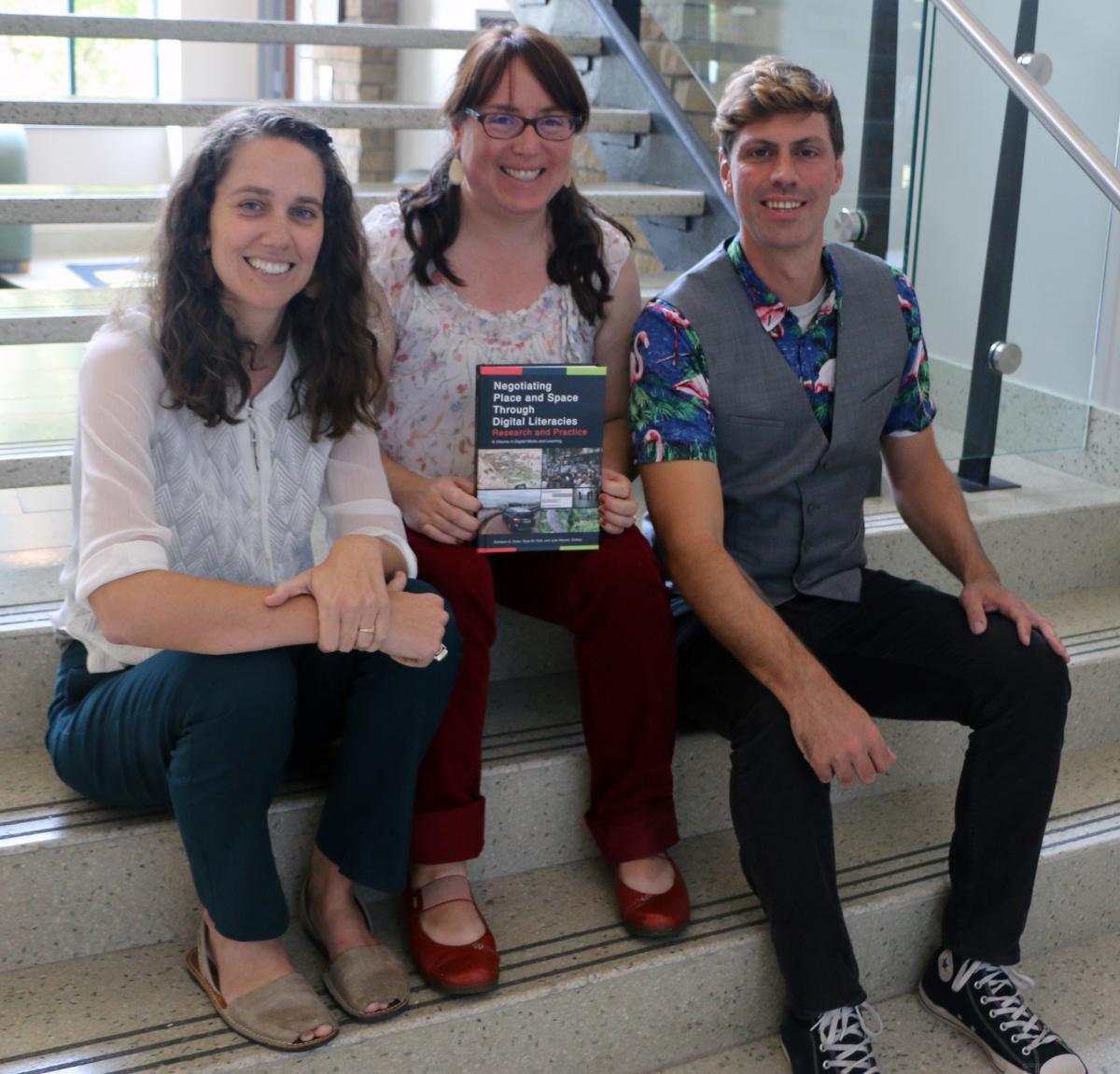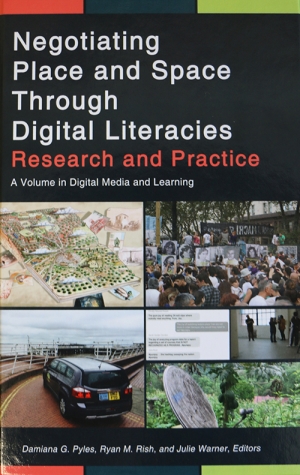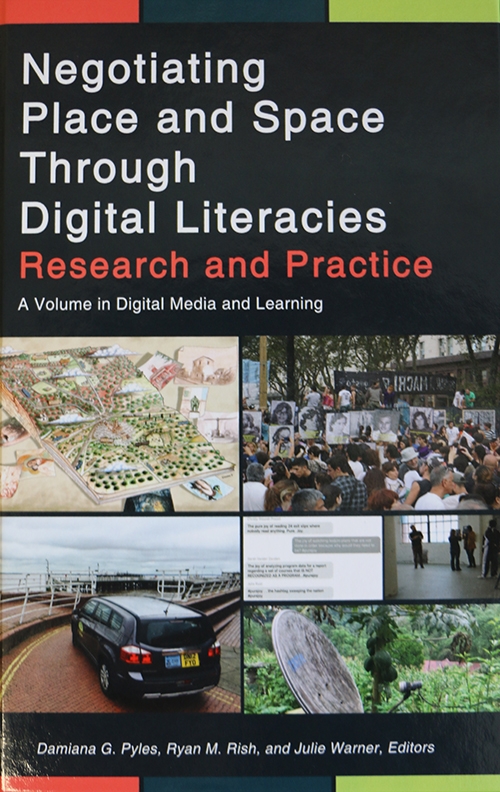Dr. Damiana Pyles, associate professor of media studies in the Department of Curriculum and Instruction in Appalachian State University’s Reich College of Education (RCOE), has published a book with co-editors Dr. Ryan Rish, associate professor at the University at Buffalo SUNY, and Dr. Julie Warner, an independent researcher based in Washington D.C., entitled Negotiating Place and Space in Digital Literacies: Research and Practice. Released this summer, the text considers how space/place, identities, and the role of digital literacies create opportunities for individuals and communities to negotiate living, being, and learning together with and through digital media.
The book has many contributors from across the globe, including two chapters from other RCOE faculty:
- Dr. Beth Buchholz, assistant professor in the Department of Reading Education and Special Education, contributed a chapter entitled, "The Virtual Carrels: (Re)Thinking Space(s) for Professional Development," that discusses how faculty from across the country use digital spaces to further their own research and connection.
- Dr. Matthew Thomas-Reid, assistant professor in the Department of Leadership and Educational Studies, contributed a chapter entitled "Queering Text: Literacies Surrounding Cyber-Trolling," in which he explores discursive privilege and queering through online forums and how university faculty can understand these spaces better.
 From left to right, Dr. Beth Buchholz, Dr. Damiana Pyles, and Dr. Matthew Thomas-Reid
From left to right, Dr. Beth Buchholz, Dr. Damiana Pyles, and Dr. Matthew Thomas-Reid
Several years ago, Pyles connected with Rish at a literacies conference, and he invited her to be a part of a new collaborative of scholars from across the South. The idea from this book stemmed from the ongoing work in that collaborative over the span of a couple of years. There were many submissions, but the book was narrowed down to fifteen chapters.
“A key part of what sets this book apart is how it focuses on how people can get agentive in their use of digital media and learning,” said Pyles. “They can work for the greater good from their own identity places.”
“As a mixed race person who grew up in rural Wyoming, I’ve always had a strong sense of how place can impact identity,” said Pyles. “So, when I pursued my dissertation topic, I knew that this had to be a central concept as I focused on how young people created media in their own communities, both urban and rural.”
“This book is a larger scale continuation of this literacy work spanning different communities across the U.S. and the world,” said Pyles.
“Some chapters explore how people communicate with one another in different identity groups online, such as Thomas-Reid’s discussion of ‘trolling artifacts’ in online spaces for social justice teaching,” noted Pyles.
The book also includes chapters that focus on how people interact with one another as teachers and scholars. An example of this is Buchholz’s collaborative chapter that explores how early career scholars leveraged digital spaces as they began their new positions as professors.
Pyles continued, “As a whole, this book widens what is thought of as digital literacies to include voices, places, and spaces that have not been heard previously, and these new voices could be very helpful for educators to hear.”
Pyles will discuss the book more at length in a digital poster presentation at the RECAPP: Research & Creative Activity at Appalachian event on October 25 from 4:30 p.m. to 6:30 p.m., fourth floor of the Belk Library.
“As a whole, this book widens what is thought of as digital literacies to include voices, places, and spaces that have not been heard previously, and these new voices could be very helpful for educators to hear.”
Pyles earned a Ph.D. in literacy studies at the University of Wisconsin-Madison and a master’s in literary studies and a B.A. in English/English education from the University of Wyoming. Her research centers on:
- how identities matter in literacies and in teaching, especially multimodally, in other words, how identities are represented in image, sound, gesture, etc.
- how young people in marginalized communities represent themselves and their communities as they create videos about their lives.
- how one’s place impacts the stories that are told and the identities that are fostered and played out.
- how early literacy learning is fostered in rural schools and how online spaces are fostering particular ways of being.
Buchholz earned a Ph.D. in literacy, culture, and language education and a M.S. in elementary education from Indiana University and a B.A. in psychology from the University of North Carolina at Chapel Hill. As a researcher, she studies at the intersection of new literacies, play, multimodal composing, and childhood studies. She works to extend current sociocultural theories to explore the social, ideological, and critical work of children as they collaboratively compose texts and identities across physical and digital boundaries. She aims to see young writers for who they are—rather than who they are becoming—and to understand how they use writing in life spaces (and digital spaces) shared with other children. She is committed to longitudinal ethnographic methodology, deeply rooted in the complexity of daily life in real classrooms, as a means of co-constructing knowledge with teachers, children, and families.
Thomas-Reid earned a Ph.D. in cultural studies from the University of North Carolina at Greensboro, a M.A.T. in middle grades social studies from the University of North Carolina at Charlotte, and a B.A. in history from Mars Hill University. His areas of research include philosophy of education, social justice education, and queer pedagogy. His current research projects focus on utilizing LGBTQIA histories and narratives with a view toward 'queering' pedagogy, praxis, and, most recently, digital literacies.
Additional work on digital spaces:
Husbye, N. E., Rust, J., B. A., Wessel-Powell, C., Vander Zanden, S., & Buchholz, B. A. (2019). Networking practitioner research: Leveraging digital spaces for professional learning and knowledge generation. Journal of Practitioner Research, 4(1), 1-22.
Gibbons Pyles, D. (2016). Rural Media Literacy: Rural Youth Filmmaking as a Media Literacy Practice. Journal of Research on Rural Education, 31(7): 1-15. (link)
Gibbons Pyles, D. (2015). A multimodal mapping of voice in youth media: The pitch in youth video production. Learning, Media, & Technology. DOI: 10.1080/17439884.2016.1095209. (link)
Gibbons, D. (2014). Rural places meet media literacy: Representing truth and self in rural social space. Journal on Images and Culture, 6. Retrieved from http://vjic.org/vjic2/?page_id=3057.
Gibbons, D., Drift, T., & Drift, D. (2011). Whose story is it? Being Native and American: Crossing borders, hyphenated selves." International Perspectives on Youth Media: Cultures of Production & Education. Ed. Fisherkeller, JoEllen. New York: Peter Lang Publishers, Inc. 172-191. (link)
Gibbons, D. (2012). Developing an ethics of youth media production using media literacy, identity, & modality. Journal of Media Literacy Education, 4(3): 256-265. (link)
Media Literacy in the RCOE
The RCOE offers innovative opportunities to study, teach, and create media through our undergraduate and graduate degree programs in media studies.
- Undergraduate Offerings: media studies minor and second academic concentration in media studies
- Graduate Programs: fully online master's degree and certificate programs

